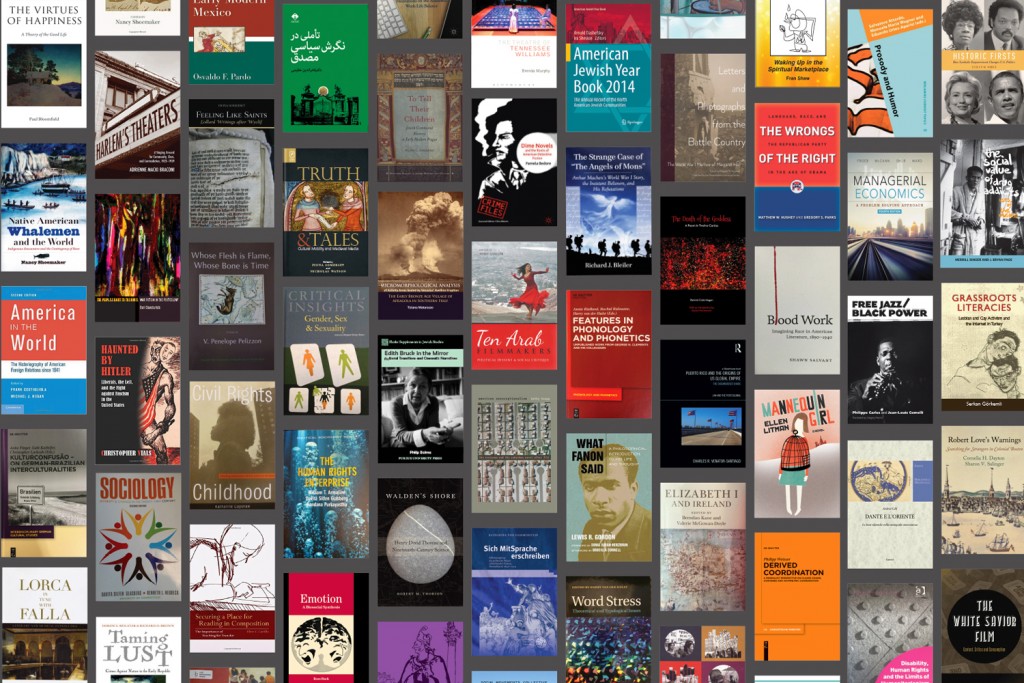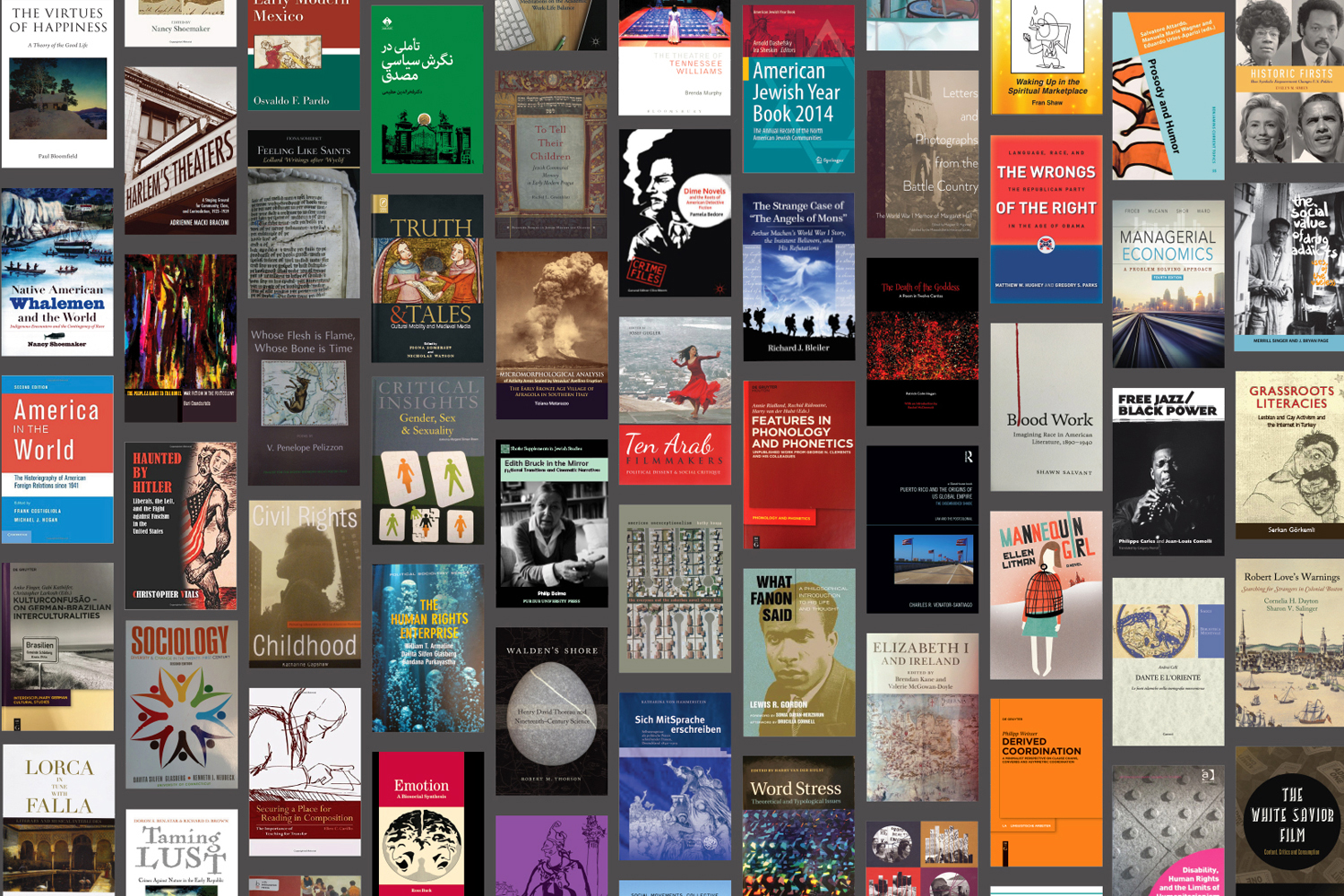
The UConn Humanities Institute in the College of Liberal Arts and Sciences will celebrate 72 books, written by 63 UConn scholars and fellows, in its biennial Celebration of Humanities Authors this week.
The books range in topics across the humanities and interdisciplinary studies, from the philosophical virtues of happiness to accounts of strangers in colonial Boston, fascism in modern American politics, how photos of black children advance social justice, the diaries of a Cold War diplomat, and why detective fiction is so popular.
“These books represent some of the best work by some of the best scholars in the world on their respective topics,” says Michael Lynch, professor of philosophy and director of the Humanities Institute. “And they illustrate the sheer range of scholarship going on at UConn, from work on Africana philosophy to a history of Native American whalers.”
The Humanities Institute’s mission is to enhance research and creativity in the humanities, broadly defined. By enabling UConn scholars and students to explore the full range of humanistic inquiry and methodologies, the Institute calls attention to the many ways that humanities scholarship enriches general understanding of the human condition.
“These books, the product of years of study and writing by faculty from a wide range of disciplines, are an impressive contribution to our understanding of our culture and society,” says Jeremy Teitelbaum, dean of the College of Liberal Arts and Sciences.
The Institute will celebrate its authors at a reception Wednesday.
Highlights of some recent books include:
Philip Balma, associate professor of literatures, cultures, and languages
Edith Bruck in the Mirror: Fictional Transitions and Cinematic Narratives (Purdue University Press, 2014)
Author, poet, screenwriter, and director Edith Bruck is one of the leading literary voices in Italy. Her experience in many concentration camps, where she lost both her parents and a brother, drives much of her art. Balma’s book attempts to advance the critical discourse on her eclectic body of work. Including previously unpublished interviews with Bruck, the book analyzes her contributions to contemporary Italian culture, which, Balma argues, should not be simply understood in terms of her willingness to revisit the subject of the Holocaust in her work. The book speaks to the discourse of scholars of Jewish studies, Italian literature, film studies, women’s studies, and postcolonial culture.
Lewis Gordon, professor of philosophy
What Fanon Said: A Philosophical Introduction to His Life and Thought (Fordham University Press, 2015)
Racism against black people often equates reason with whiteness, and emotion – and thus supposedly unreason – with blackness. Gordon offers a portrait of the Afro-Caribbean revolutionary psychiatrist, physician, and philosopher Frantz Fanon as an example of a modern thought leader on colonialism and racism. Working from his own translations of the original French texts, Gordon critically engages everything in Fanon’s work, from dialectics, ethics, existentialism, and humanism to philosophical anthropology, phenomenology, and political theory, as well as psychiatry and psychoanalysis. The work exemplifies, Gordon argues, what Fanon represented in his plea to establish newer and healthier human relationships beyond colonial paradigms.
Nancy Naples, Board of Trustees Distinguished Professor of Sociology and Women’s, Gender, and Sexuality Studies, and Jennifer Bickham Mendez, associate professor of sociology at The College of William & Mary (eds.)
Border Politics: Social Movements, Collective Identities, and Globalization (NYU Press, 2014))
The world’s borders have taken on heightened material and symbolic significance, shaping identities and the social and political landscape and becoming sites of struggle over social belonging and cultural and material resources. Naples and Mendez explore 11 case studies in geographic contexts around the globe to conceptualize struggles over identity, social belonging, and exclusion as extensions of border politics. In doing so, the authors capture the complex ways in which geographic, cultural, and symbolic dividing lines are blurred and transcended, but also fortified and redrawn. This book notably places right-wing and social justice initiatives in the same analytical frame to identify patterns that span the political spectrum.
Gregory Semenza, associate professor of English, and Bob Hasenfratz, professor and head of the Department of English
The History of British Literature on Film, 1895-2015 (Bloomsbury Publishing, 2015)
From “The Death of Nancy Sykes” (1897) to “The Hobbit: The Battle of the Five Armies” (2014), films of British literature have a complex and fascinating history. Semenza and Hasenfratz’s book is a comprehensive narration of cinema’s 100-year-old love affair with British literature. Unlike previous studies, which often focus on classics like Shakespeare, Jane Austen, or Frankenstein, this volume considers the multiple functions of filmed British literature as a cinematic subject. In what ways has the British literary canon influenced the history and aesthetics of film, and in what ways has filmed British literature both affirmed and challenged the very idea of a literary canon? This work shows how these adaptations emerged from and continue to shape the social, artistic, and commercial aspects of film history.
Nancy Shoemaker, professor of history
Native American Whalemen and the World: Indigenous Encounters and the Contingency of Race (The University of North Carolina Press, 2014)
In the 19th century, nearly all Native American men living along the southern New England coast made their living traveling the world’s oceans on whaleships. At home, aboard ship, or around the world, they encountered distinct racial expectations about who was “Indian” and how “Indians” behaved. Treated by their white neighbors as degraded dependents, these Native New Englanders nevertheless rose to positions of command at sea. This, Shoemaker argues, complicates our myths of exploration and expansion depicting cultural encounters as the meeting of two peoples, whites and Indians. Highlighting the shifting racial ideologies that shaped the lives of these whalemen, Shoemaker shows how the category “Indian” was as fluid as the whalemen were mobile.








